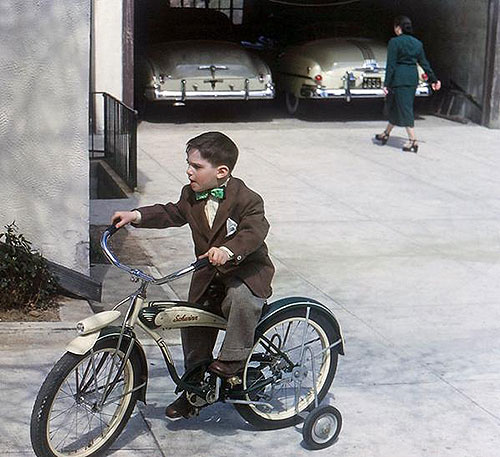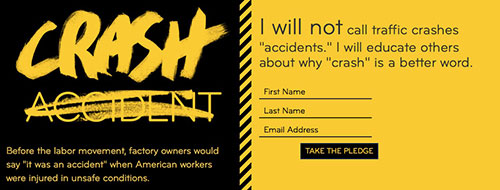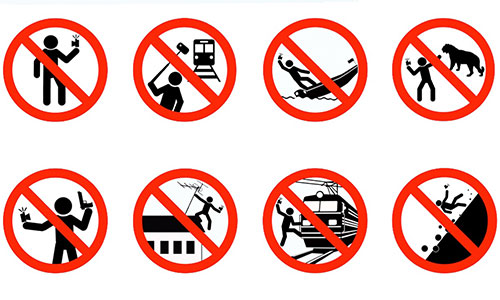Return on investment
The cities that spend the most on bike lanes later reap the most reward:
For every dollar spent to build new separated bike lanes, cities could save as much as $24 thanks to lower health care costs and less pollution and traffic, according to a new study from researchers in New Zealand.
What do you mean by that?
The campaign claims the word "accident" first took hold during the Industrial Revolution, where worker deaths were described as such so factories would not be responsible for updating faulty equipment or fixing poor conditions. When Americans started driving, the term transferred well to our naturally litigious society where the term "car accidents" would not denote fault and therefore jeopardize pending insurance claims. "Accident" also helped the institutions that built the roads make it seem like collisions weren't their fault, either—accidents were inevitable.
Data
The Bureau of Infrastructure, Transport and Regional Economics has published its Australian cycling safety report:
In this paper, several sources of bicycle crash data and exposure data are used to provide an overview of cycling safety and data sources in Australia. Recent trends are identified.
It's the infrastructures
Those whacky Greens, always with the crazy talk. Like drivers vs cyclist is not either/or:
So many more of our society can enjoy these benefits if we remove barriers. The biggest thing holding people back is a lack of infrastructure. 44% of people are prevented from cycling because facilities aren't sufficient. People in the inner city might be doing okay, but as you move out to the suburbs and beyond, it's just not feasible to hop on your bike.
No it's the helmets
Urbanful asks do bike helmet laws boost public safety?
"We're not against helmets. They are mandated in many competitive races, and amateur racers should follow that example," CBC's leaders wrote in an online petition against Liu's proposed bill. "But there are proven ways to make our streets safer while encouraging bicycling—reducing speed limits on key streets, building protected bike lanes and bike paths, and educating motorists and bicyclists on how to drive or ride safely, to name a few. A mandatory helmet law is not one of them."
So it turns out that it is the infrastructure. [twitterer]
No, no it's the sweats!
Where are all the female cyclists? wonders Margaret Wente in The Globe and Mail:
I know why women don't cycle to work. It's not just the fear that they'll be wiped out at any moment by car doors and streetcar tracks. It's the sweat. How, exactly, are you supposed to arrive at your job fresh-smelling and well-groomed after a hot ride in July? It's not possible. Presumably the answer is to stuff your work clothes in your backpack, towel yourself down in the ladies' room, and reapply your makeup before that 9 a.m. meeting. Which still doesn't address the problem of helmet head.
Who is she kidding? Fear of bad hair is greater than fear of death? Really?
Actually, no. If there aren't as many women cycling as men … you need better infrastructure. [twitterer]
A nice rebuttal here, in the best cycling-to-work tips from Chatelaine staffers. [twitterer]
And Claire McFarlane of dandyhorse got pretty angry about it:
So Margaret, to answer your initial question: Where are all the female cyclists?
We're here, and we're kicking ass. So please stop spreading your misogynistic propaganda.
And so, yet another hashtag was born…#wenting
Finally, Momentum offers several good answers to excuses for not riding.
Precious moments
A beautiful piece from Keith Snyder, Hoyt's Hill:
In a couple of seconds, there was a tiny wobble in his rear wheel. I knew what that was, and I saw him ease off and get back inside it. He wasn't to the intersection yet. Apprehension got me, as if there was anything I could do if he overshot now.
Don't read the comments
More embarrassing ideas being floated by the NSW Roads Minister Duncan Gay: cyclists to be required to carry photo identification under NSW government proposal.
As usual, don't read the comments—unless the comment is from Jack of Balmain:
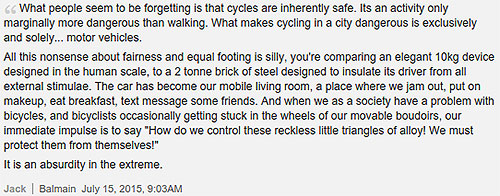 Thanks Jack, whenever I use the term "movable boudoir" the credit is yours.
Thanks Jack, whenever I use the term "movable boudoir" the credit is yours.
Do read comprehensive take-downs by Michael O'Reilly and Sue Abbott.
Doing it NSW style
 The Lord Mayor has a message for Melbourne cyclists
The Lord Mayor has a message for Melbourne cyclists
Before we laugh too hard at the tragi-comedy playing out in Sydney, Duncan Gay-style wacky ideas came to Melbourne this week—Lord mayor Robert Doyle in push to get cycles off roads in Melbourne's CBD:
The lord mayor last week spoke at a State Library lecture, where he suggested cyclists should be stopped from using Flinders, King and Lonsdale streets…Speaking to Fairfax Media on Thursday, Cr Doyle said Princes Bridge, Swanston Street, St Kilda Road, and La Trobe and Albert streets were already considered preferred routes for cyclists.
Umm, Mr Mayor, you are aware that the "preferred route" Albert Street—with one of Melbourne few protected bike lanes—leads directly into Lonsdale Street, aren't you?
In an interview on 3AW he added:
"The funny thing is this is not anti-cycle. This is pro-cycle. This is common sense to keep people safe."
Serving canned spam with apple sauce doesn't make it roast pork.
Calling a bike ban a "system of preferred streets for bikes" doesn't make it "pro-cycle".
The Herald Sun lapped it up, making it front page news, complete with the graphics:
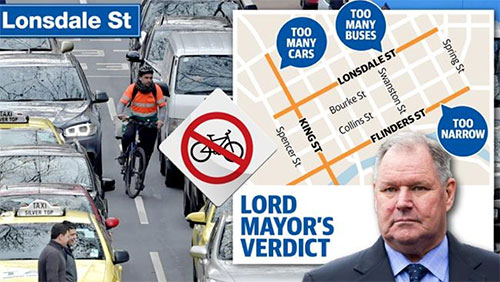 The Herald Sun says Flinders Street is "too narrow" for bikes
The Herald Sun says Flinders Street is "too narrow" for bikes
I'm just not convinced that Flinders Street qualifies as a "narrow" street by any conventional definition of the word.
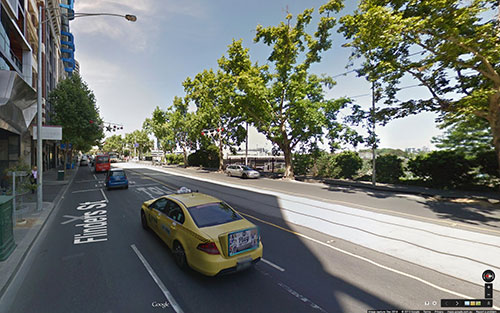 Google Streetview says "Pfft! I've seen narrower highways!"
Google Streetview says "Pfft! I've seen narrower highways!"
Meanwhile in London, they've got it all the wrong way around where lorries could be banned from city streets to make them safer for cyclists. [twitterer]
And Steven Herrick recommends Robert Doyle and Duncan Gay "do a Bronwyn" and take a fact finding trip to Holland.
In the meedya
As all of this nonsense plays out in the media, people's opinions, attitude, and actions are shaped:
Finally, as ever with the issue of the media treatment of cycling, we come to the sharp end: what effect does it have on real life on the roads? My own view – and I realise it's impossible to prove – is that there is sufficient evidence about poor attitudes towards cyclists translating into less safe driving behaviour, that we can say such "controversial talking points" do, in a tiny but incremental way, put people's lives and welfare in more danger.
Peter Walker tends to take that personally. And so do I.
Pain as spectacle
I have total respect for the hard men and women of the peloton who can ride on after a nasty prang but sometimes I, like Kath Bicknell, wonder what's with racing through injury?
Betteridge's Law of Headlines
Testicular cancer & cycling: is there a link?
Could two cases of testicular cancer in the world's top cyclists be a coincidence, or does something about competitive cycling increase men's risk of the disease?
Armstrong diagnosed in 1996. Basso diagnosed in 2015. Two cases twenty years apart doesn't even qualify as a coincidence let alone anything approaching significance.
Best of luck to Ivan for his treatment and recovery.
Always practice safe selfie
"Before taking a selfie, everyone should think about the fact that racing after a high number of 'likes' could lead someone on a journey to death and his last extreme photo could turn out to be posthumous," Alexeyeva warned.
Sure, but there's a stupid selfie scenario that they missed:
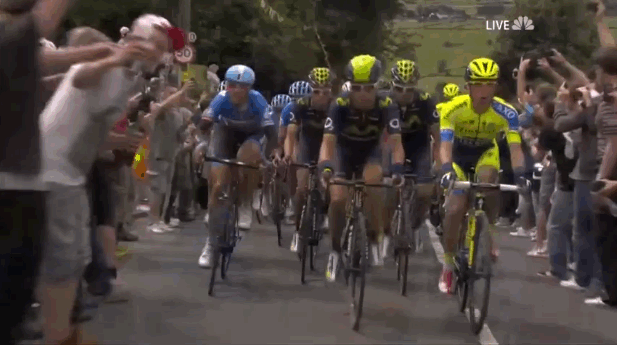 Selfie!
Selfie!
Are you paying attention?
More roads not the answer to Melbourne's congestion woes, VicRoads says:
Nine of Melbourne's major thoroughfares are rapidly reaching capacity and the city cannot just "build its way out of congestion", VicRoads chief executive John Merritt says.
That's tough, but let's look at the alternatives:
Mr Merritt advised motorists to use public transport, ride a bicycle or find a new job closer to home to deal with the city's growing traffic congestion.
It must be asked, what is VicRoads doing to help make this happen?
Anyway, just to show that he's paying attention:
Shadow attorney-general John Pesutto said it was an "indictment" of the Government's decision to scrap the East West Link project.
Which part of the statement "We can't just build our way out of congestion" do you struggle with there, John?
